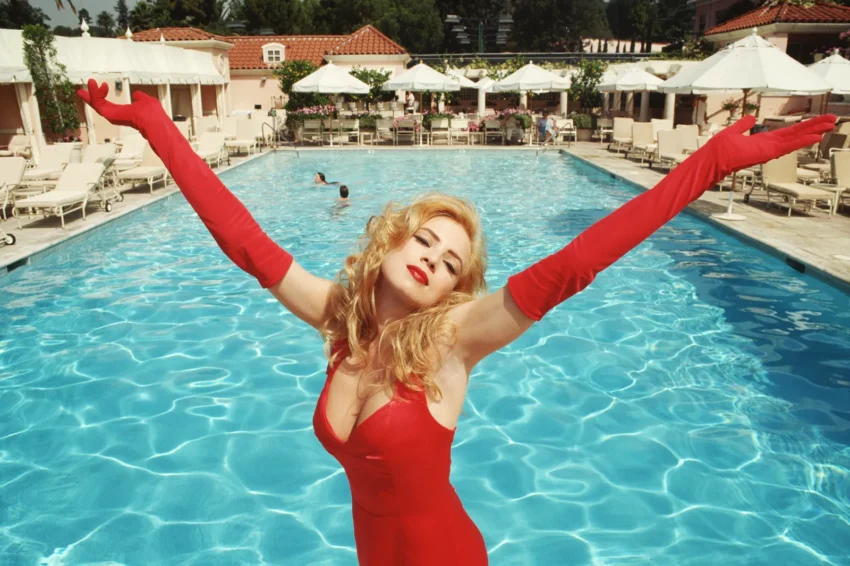The story of Traci Lords, though, doesn’t seem like the most obvious Hollywood saga—after all, it takes place over the hills in the San Fernando Valley. But for Anolik, host of the new podcast Once Upon a Time in the Valley, Hollywood and the porn industry that Lords dominated in the mid 1980s are far more closely related than either might admit. “The porn industry is overtly about what the movie industry is covertly about: sex and fantasy, objectification and exploitation,” Anolik said. “It’s the movie industry without the pretense. Or the hypocrisy.”
Lords was the biggest star in the porn industry for several years in the mid ’80s, until a dramatic FBI raid revealed that she had gotten her start when she was just 15, and nearly all of her films were thereby illegal. In her conversations with porn industry insiders that inspired the podcast, Anolik learned that the Lords saga was “the wound that refused to heal for the adult industry”—and also a mystery that remained, tantalizingly, unsolved
lili Anolik: First of all, the Traci Lords story is, fundamentally, a Hollywood story. This is sex, glamour, scandal, crime, and the movies—just a different kind of movie. And Hollywood isn’t only my beat, it’s my obsession.
I’m getting ahead of myself, though, because I should explain the story first: Traci Lords was the biggest porn star in the world in the mid 1980s. Then, in July of ’86, it was revealed in dramatic fashion—the FBI busting down Traci’s door—that she’d been underage for virtually her entire adult career. This was a huge scandal, and one I was totally unaware of, because at the time it broke I was seven years old.
Confession: I have my own porn past. I’m teasing, but I’m a little serious. I broke into print by writing about Al Goldstein, founder of Screw magazine and a major figure in the adult industry in the ’70s and ’80s. (This is obviously way before I was a contributing editor at Vanity Fair.) One afternoon in 2012, I went to lunch in the Valley at a Hamburger
Hamlet with adult veteran Bill Margold, who’d codirected Traci, and adult agent Jim South, who’d represented Traci. Traci, and what happened 25 years ago, was the topic of conversation between these two. Not for part of the lunch, for the whole lunch. The way they told the story was as a noir, with Traci as the ne plus ultra of femmes fatales: She’d scammed the adult industry with a fake ID; had made one movie after the age of 18, a movie she owned the rights to; and then she’d blown the whistle on herself to make more money and become more famous. And the anger of both these men was still, all these years later, hot to the touch. I wanted to find out why. Why was Traci Lords the wound that refused to heal for the adult industry? And who was this Traci Lords anyway, this teenager who’d single-handedly almost taken out an entire industry of hardened professionals?
Naturally, I immediately went out and bought Traci’s memoir. Her version of the story was a cross between a cautionary tale and a survival guide: She was an innocent victim, a 15-year-old kid who’d gotten caught in the clutches of the scummy adult industry and had made it out alive but only through sheer luck; she certainly hadn’t tipped off the FBI. Needless to say, Traci’s version and the adult industry’s version were at odds. I mean, violently at odds. And as a writer and a journalist, I was attracted to the contradictions and the ambiguities. This was a real-life mystery: Who ratted out Traci Lords? Who told the FBI she was underage?
And I teamed up with Ashley West to investigate the mystery, because how could I dream up a better partner? He’s the creator of the Rialto Report, a web and podcast channel that documents the golden age of porn, and was a consultant on all three seasons of HBO’s The Deuce. Plus, Ashley has his own special connection to Traci, which will be revealed in episode six.
This is Traci’s story, but it’s also an examination of the porn industry as a whole. Why did you want to broaden the scope of the story so much?
I write about Hollywood—whether it’s a cover story for Vanity Fair on an actor or actress, or a piece on Joan Didion’s screenwriting period, or my book on L.A. writer/artist/muse/minx Eve Babitz, Hollywood’s Eve. It’s what compels me. Hollywood has hijacked my imagination.
I live in New York, but I’m in L.A. all the time for work. And when I’m there, I always make it a point to drive Mulholland, my favorite street in the city. It traces its serpentine path through the Santa Monica Mountains, and you’ve got, on one side of you, a spectacular view of Hollywood, home of the movie industry, and on the other side, a spectacular view of the San Fernando Valley, home of the porn industry. And if the geographical separation between the two industries is narrow, the psychological isn’t even that. The porn industry is overtly about what the movie industry is covertly about: sex and fantasy, objectification and exploitation. It’s the movie industry without the pretense. Or the hypocrisy
